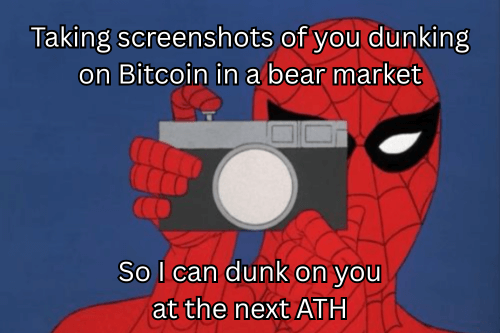
Glossary
Bitcoin, Cybersecurity and Citizenship programs are full of acronyms and unfamiliar language. Use our glossary to look up useful terms you’ll come across on your journey.
A password plus a second step (like a phone code) to keep your account safe.
A hardware device that is not physically connected to any computer or Internet device, instead using tools such as QR codes or SD cards to pass information between devices.
A suggestion for upgrading Bitcoin. For example, BIP39 created the 12 or 24-word seed phrases we use for wallets.
The main Bitcoin blockchain where all official transactions are stored.
A decentralized, peer-to-peer, globally available digital money used to send and receive value without need for permission, fear of censorship, or third-party intermediaries.
The main software that runs the Bitcoin network and allows users to verify transactions by running a full node.
A "box" of Bitcoin transactions. Every 10 minutes, a new block is added to the chain.
A technology that serves a crucial role in Bitcoin and acts as a "distributed public ledger" that links all "blocks" of transactions in a contiguous, immutable "chain."
A legal status that signifies full membership in a nation or state, granting individuals rights such as voting, access to a passport, holding public office, and accessing social services, along with responsibilities like obeying laws and paying taxes.
Malware that changes a Bitcoin address in your clipboard to the hacker’s address. Always double-check the address before sending!
A method of custody whereby Bitcoin is stored entirely offline and inaccessible to anyone without direct, physical access to a wallet.
A Bitcoin wallet where a third party holds the private keys on your behalf.
Involves protecting personal or sensitive data from exposure to unwanted third-parties, including names, addresses, Internet traffic, government IDs, and others.
Allows remote workers to live and work in a country legally while performing their job online for a foreign employer or business.
A service provider that translates and routes Internet traffic by converting URLs (e.g., www.thebitcoinway.com) to computer-readable IP addresses for the purpose of serving and delivering websites to end users.
A person's permanent legal home, often used in tax and legal contexts.
Holding citizenship in two countries simultaneously.
A fake wallet or second password you give up if you're being physically threatened.
Tiny bits of Bitcoin that cost more to send than they’re worth.
A process whereby individuals can obtain citizenship in a country through financial investment, often taking the form of registering a business, purchasing real estate, or providing a gift to the government.
The process of converting data into an unreadable format to those without proper keys for protection of sensitive information.
A security system that monitors and controls, then blocks or permits, incoming and outgoing network traffic based on predetermined rules.
A hack where the code running on a hardware wallet is tampered with to leak your private keys.
A strategy for diversifying citizenship, residency, and assets across multiple countries to optimize freedom and security.
A computer running Bitcoin Core that fully validates all transactions and blocks. It helps enforce the rules of Bitcoin.
The very first Bitcoin block, created by Satoshi Nakamoto in 2009.
A residency program offering residency or citizenship in exchange for significant investment in the host country.
Originally a typo of “hold.” Now it means: don’t sell your Bitcoin — hold through the ups and downs.
Every 4 years, Bitcoin mining rewards are cut in half. This makes Bitcoin rarer over time.
A small, handheld device used for storing private keys and signing Bitcoin transactions.
A Bitcoin wallet connected to the Internet, typically used for daily transactions.
A unique web address that enables transmission of data, websites, and other information across the Internet.
A process used by exchanges and financial services to verify customer identity; not required to work with The Bitcoin Way.
A hidden program that records what you type, which could steal your passwords.
A system built on top of Bitcoin for instant, cheap payments.
The waiting room for Bitcoin transactions before they get added to a block.
When your Bitcoin use leaks info like IP address, browser data, or transaction patterns.
The use of two or more authentication mechanisms (e.g., a password plus an authentication code) to log in or access services.
A method to enhance Bitcoin custody security by requiring multiple private keys to authorize a Bitcoin transaction.
The legal process by which a non-citizen acquires citizenship in a foreign country.
A participant in the Bitcoin network that helps verify and broadcast transactions using a small computing device.
A special visa designed for remote workers or digital nomads allowing them to live in a foreign country while working online.
A wallet where you hold the private keys and have full control over your Bitcoin.
Bitcoin bought without giving up personal information, often considered more private and censorship-resistant.
Software whose source code is freely available for anyone to view, modify, and distribute.
The software that supports a computer or phone’s general functions, including running applications and authenticating users.
A unique number, usually six digits in length, used to access a Bitcoin hardware wallet.
A “25th word” created by the user that is appended to a seed phrase to generate a new Bitcoin wallet and increase overall security.
A seedphrase can be anything you like, but to be secure make sure to use something of a reasonable length and include numbers, letters and special characters. Here's an example:
H1deY0urE@sterEgg$
Direct communication or transaction between users without intermediaries, which Bitcoin enables.
A legal status that allows an individual to live, work, and study indefinitely in a country without becoming a citizen, while typically granting access to many of the same rights and benefits as citizens, except for voting and holding certain public offices.
Fake emails or websites pretending to be real, trying to trick you into giving them your seed phrase.
Legal access to live in, either temporarily (temporary residency) or indefinitely (permanent residency), a foreign jurisdiction, used as a backup option in the event of war, economic turmoil, or other catastrophic event affecting one's native country.
A phone designed with features that enhance user privacy.
A cryptographic key that allows a user to access and control their Bitcoin.
Software that is privately owned, with its source code hidden from users, limiting modification and redistribution.
Like your account number. It’s used to make your Bitcoin address.
A specialized type of barcode designed to store information for wireless transmission of information, such as for signing Bitcoin transactions.
A fake QR code that looks real but sends Bitcoin to a hacker’s address instead of yours.
Properly storing multiple copies of your seed phrase (e.g., metal plates) to avoid loss due to fire or water damage.
The ability to access a device, such as a Bitcoin node, when not connected to the same wireless network.
While common in altcoins, in Bitcoin this can refer to scam services or wallets that disappear with users' funds.
A small device used for saving information; may be used for signing Bitcoin transactions with a hardware wallet and inserted into a computer to finalize sending via a software wallet.
A series of words generated by your wallet to recover your Bitcoin if lost. a 12 word seed phrase would look something like this:
- wood
- layer
- decorate
- antique
- spirit
- suffer
- hub
- spoil
- goddess
- health
- above
- enrich
A 2017 upgrade that made Bitcoin transactions smaller and cheaper.
Controlling your Bitcoin without relying on third-party custodians.
A manipulation technique that exploits human psychology to gain confidential information, such as through scam phone calls, phishing emails, or other means of inciting action that will expose sensitive data.
A Bitcoin wallet that runs on a computer, designed to initiate the sending and receiving of transactions and connected to a node for private transmission to the Bitcoin network.
A country offering low or zero taxes to attract foreign individuals or businesses.
A legal status granted to individuals allowing them to live in a country for a limited period, typically for purposes such as work, study, tourism, or family reunification, without granting permanent settlement rights.
A unique code for every Bitcoin transaction.
A “chuck” of on-chain Bitcoin made accessible by access to its private keys; UTXOs should be sufficiently large to ensure useful for paying network fees, but sufficiently small for maintaining privacy when transacting.
A service that encrypts your internet connection and hides your IP address, enhancing your privacy online.
A legal document granting permission to enter, stay, or work in a foreign country for a specified period.
A unique ID generated to provide assurance that a user is viewing and using the Bitcoin wallet they intend to be accessing.
A wallet that can see your Bitcoin balance but can’t spend it because it has no private keys.
Pursue your
freedom today
Every journey begins by taking the first step. Book a free 30-minute consultation with one of our experts and let’s start securing your future.
Secure Clients Are Happy Clients
We build lasting relationships with our clients. Check out their feedback:
Don't trust; Verify:
Testimonials →Blog
Expand your Bitcoin knowledge with our latest blog articles












